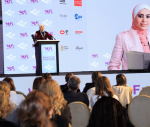You are here
Arab leaders support Jordan’s role in Jerusalem
By Mohammad Ghazal - Mar 26,2014 - Last updated at Mar 26,2014
KUWAIT— Arab leaders on Wednesday rejected Israel’s attempts to end the Hashemites’ custodianship over Al Aqsa Mosque and held it accountable for the impasse in the peace process and continued tensions in the Middle East.
The Arab leaders voiced their rejection of Israel’s demand to be recognised as a Jewish state and denounced continued settlement activities by Tel Aviv and its attempts to Judaise Jerusalem and change the demographics and geographic situation in the holy city, according to the Kuwait Declaration released at the end of the Arab summit in the Gulf emirate.
“We call on the Security Council, the EU and UNESCO to live up to their responsibilities towards Al Aqsa Mosque,” Kuwaiti foreign ministry undersecretary, Khaled Al Jarallah, said as he read out the final statement issued following the two-day summit.
Last year, Jordan and Palestine signed an agreement under which the Palestinian side “reaffirmed” the status of His Majesty King Abdullah as the custodian of the holy sites in Jerusalem. Under the deal, King Abdullah enjoys the “full right to exert all legal efforts to safeguard and preserve [Jerusalem’s holy sites], especially Al Aqsa Mosque, the main feature of Al Haram Al Sharif compound [or the Noble Sanctuary whose area is estimated at 144 dunums]”.
The Arab leaders stressed that reconciliation among the Palestinian factions is key to realising the aspirations of the Palestinian people.
The Arab leaders condemned the massacres committed by the Syrian regime against the defenceless civilians, including the use of internationally prohibited weapons.
However, they called for political solution to the Syrian crisis in accordance with the Geneva I Declaration.
“We stress our solidarity with the Syrian people and support their legitimate rights in freedom and democracy and establishing a regime where all Syrians enjoy the right to participate in all institutions without any discrimination because of race, religion or sect,” said the communiqué.
Arab leaders pledged to work to end rifts amongst them, according to the declaration.
“We pledge to work to put an end to the Arab divide through fruitful and constructive dialogue and to end all types of differences through transparency and honesty in words and deeds.”
Announcing the end of the summit, Kuwaiti Emir Sheikh Sabah Al Ahmad Al Jaber Al Sabah said discussions during the summit reflected the Arab leaders’ genuine willingness to enhance Arab ties to reach desired levels.
Fourteen leaders attended this year’s summit, which was held in Kuwait for the first time.
Next year’s summit is scheduled to be held in Egypt.
Related Articles
Arab leaders on Wednesday rejected Israel’s attempts to end the Hashemites’ custodianship over Al Aqsa Mosque and held Israel accountable for the impasse in the peace process and continued tensions in the Middle East.
Arab leaders are expected to endorse a resolution at Tuesday’s Arab summit to technically and financially support Jordan to deal with the impact of some 1.3 million Syrians living in the country, including some 600,000 registered refugees, a Jordanian official said here.
His Majesty King Abdullah on Tuesday said further sincere efforts are needed in the region to consolidate moderation, advance the principle of active citizenship and unleash the potential of future generations as the multiple conflicts in the region have created a fertile environment for the spread of extremism and terrorism.



















